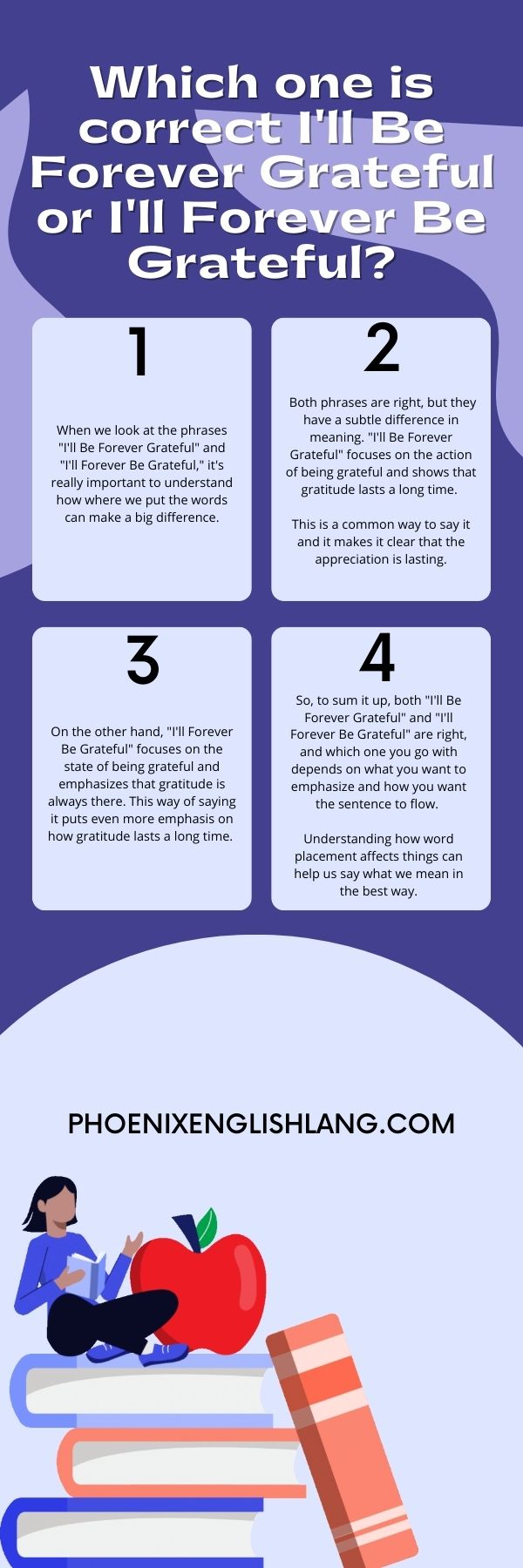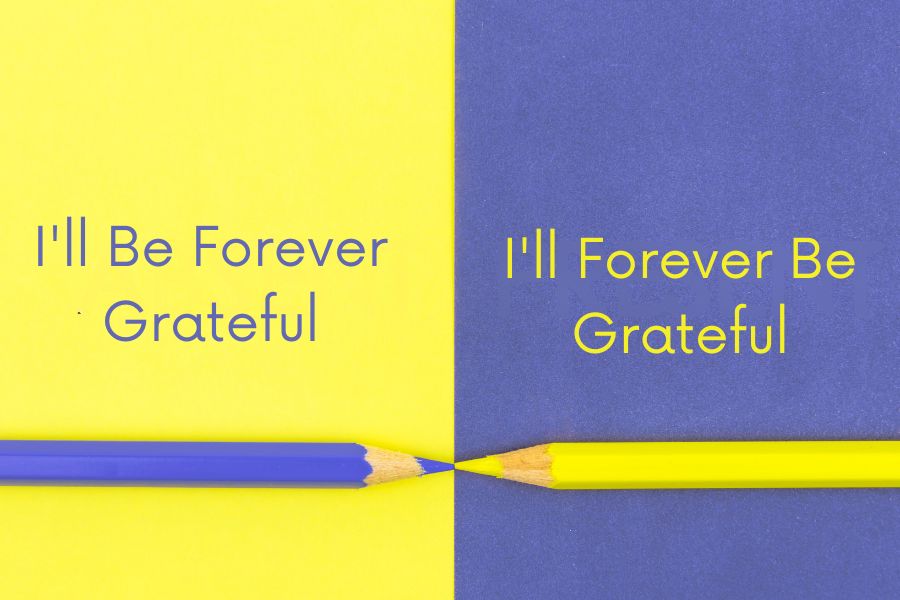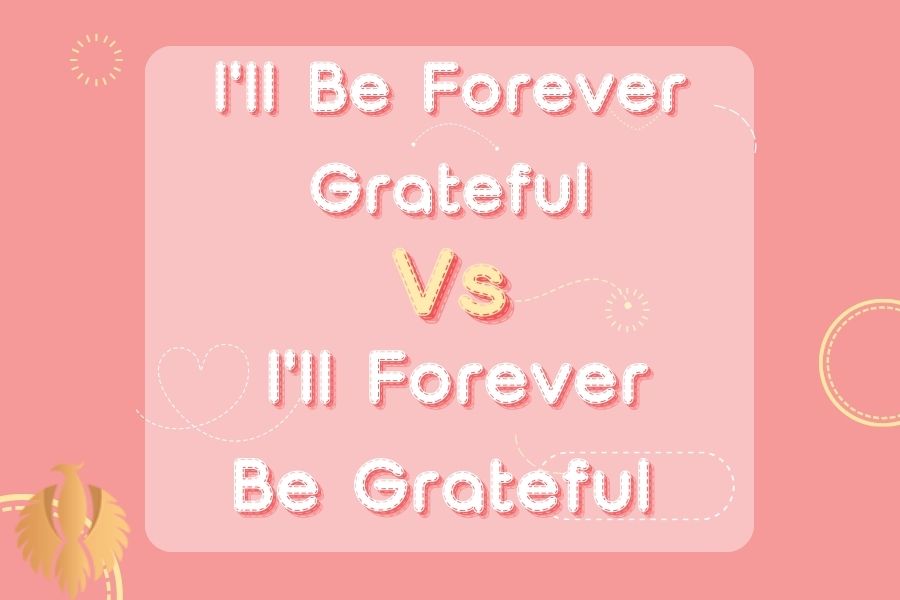The choice of words and their arrangement can significantly alter the meaning of a phrase, which I find incredibly intriguing about language.
When discussing deep gratitude, it raises the question of which phrase is preferable or more grammatically sound: “I’ll Be Forever Grateful” or “I’ll Forever Be Grateful.”
In this discussion, I plan to explore these expressions thoroughly, examining how people use them and what they signify through examples and analysis.
By comparing these two phrases, we can gain a clearer understanding of their meanings and determine which one is more suitable.
Language is an incredibly powerful instrument, and our usage can express far more than just the straightforward meaning of the words.
When I say, “I’ll Be Forever Grateful,” it emphasizes a lasting state of gratitude. Conversely, “I’ll Forever Be Grateful” seems to focus on the ongoing nature of my gratitude, suggesting it will persist endlessly.
These subtle distinctions can significantly influence the nuance of what I aim to convey.
I often find myself reflecting on the best phrases to use in various situations. For example, when I’m crafting a thank-you note or showing appreciation to someone who has significantly influenced my life, I want my words to genuinely express the depth of my gratitude.
It’s not merely about being courteous; it’s about sharing heartfelt emotion and appreciation.
In this journey, I’ll explore different examples of how these phrases are utilized in various contexts.
By examining these instances, I aim to identify any trends or preferences that could guide us in choosing the most suitable phrase for specific situations.
For instance, one phrase might be favored in formal writing, while a different one could be more fitting in casual conversations.
I’ll also take a closer look at the grammatical elements of these phrases. Although both “I’ll Be Forever Grateful” and “I’ll Forever Be Grateful” are grammatically sound, the position of the word “forever” can influence the emphasis and rhythm of the sentence.
Grasping these subtleties can empower us to make better choices in our writing and speaking.
Additionally, I will explore the emotional effects of these phrases. Language goes beyond mere rules and structure; it also influences our feelings and impacts those who listen to or read our words.
By delving into the emotional weight of each phrase, I aim to shed light on how we can use language to forge deeper connections with others.
Alongside examples and analysis, I’ll share some personal stories and experiences where I’ve employed these phrases.
Reflecting on these instances will help demonstrate the real-world implications of our word choices and how they can influence our interactions and relationships.
Now, let’s explore the phrases “I’ll Be Forever Grateful” and “I’ll Forever Be Grateful.”
By the conclusion of our discussion, I hope we’ll gain a better understanding of these expressions and feel more prepared to use them effectively in our lives.
Whether you’re crafting a heartfelt letter, delivering a speech, or simply sharing your gratitude in daily conversations, selecting the right words can truly make a difference.
Let’s embark on this linguistic adventure together and uncover the power of gratitude conveyed through language.
Which one is correct I’ll Be Forever Grateful or I’ll Forever Be Grateful?

In my classes, I always talk about how important it is to put words in the right order and structure sentences properly so that we can get our meaning across.
When we look at the phrases “I’ll Be Forever Grateful” and “I’ll Forever Be Grateful,” it’s really important to understand how where we put the words can make a big difference.
So which one is correct? Both phrases are right, but they have a subtle difference in meaning. “I’ll Be Forever Grateful” focuses on the action of being grateful and shows that gratitude lasts a long time. This is a common way to say it and it makes it clear that the appreciation is lasting.
On the other hand, “I’ll Forever Be Grateful” focuses on the state of being grateful and emphasizes that gratitude is always there. This way of saying it puts even more emphasis on how gratitude lasts a long time.
When it comes down to it, which phrase you choose depends on what you like and what you want to emphasize.
Both of them show a deep sense of gratitude, but the slight difference in word order can change what the sentence is mainly about.
So, to sum it up, both “I’ll Be Forever Grateful” and “I’ll Forever Be Grateful” are right, and which one you go with depends on what you want to emphasize and how you want the sentence to flow.
Understanding how word placement affects things can help us say what we mean in the best way.
You might also enjoy: Too Cute Meaning Vs To Cute (To Vs Too) + Examples
The Main Differences Between I’ll Be Forever Grateful Vs I’ll Forever Be Grateful

Word Order
The word order is different in the two phrases. “I’ll Be Forever Grateful” has the verb “be” before the adverb “forever,” while “I’ll Forever Be Grateful” has the adverb before the verb.
Naturalness
“I’ll Be Forever Grateful” sounds more natural and is commonly used in everyday language.
Stylistic Variation
“I’ll Forever Be Grateful” may be used for stylistic variation or poetic effect.
Personal Preference
The choice between the two phrases may come down to personal preference or individual writing style.
Contextual Suitability
The choice between the two phrases may depend on the specific context or intended meaning.
Rhythm and Flow
The two phrases have a slightly different rhythm and flow due to the variation in word order.
Common Usage
“I’ll Be Forever Grateful” is more commonly used in everyday conversations and writing.
Formality
“I’ll Be Forever Grateful” is generally considered more formal than “I’ll Forever Be Grateful.”
Intensity
“I’ll Be Forever Grateful” may convey a stronger sense of gratitude compared to “I’ll Forever Be Grateful.”
Cultural Influence
The choice between the two phrases may be influenced by cultural or regional language preferences.
Emotional Tone
“I’ll Be Forever Grateful” may sound more emotionally sincere or heartfelt compared to “I’ll Forever Be Grateful.”
Grammatical Correctness
Both phrases are grammatically correct, but “I’ll Be Forever Grateful” follows a more standard word order.
Interpretation
The interpretation of the two phrases may vary slightly, with “I’ll Be Forever Grateful” focusing on the gratitude itself and “I’ll Forever Be Grateful” emphasizing the enduring nature of the gratitude.
You might also enjoy: Messege Vs Message Correct Spelling + Examples [2023]
Analyzing the Contrast: “I’ll Be Forever Grateful” vs. “I’ll Forever Be Grateful”

When you’re looking at the difference between the phrases “I’ll be forever grateful” and “I’ll forever be grateful,” it’s important to understand how they’re subtly different in how they’re said and what they focus on.
In my classes, I always tell my students to pay attention to how they order their words to make sure they’re being clear and effective.
“I’ll be forever grateful” puts the focus on the feeling of being grateful, like it’s something that will never go away.
It suggests that you’ll always appreciate something and that it has a lasting impact.
In my classes, I always make sure to point out that this way of saying it shows that gratitude is a fundamental part of who you are.
On the other hand, “I’ll forever be grateful” puts the focus on the action of being grateful.
It suggests that you’ll keep showing your gratitude over time.
In my classes, I teach my students that this way of saying it shows that expressing gratitude is an ongoing thing and that you’re committed to always having a grateful mindset.
Both phrases show a sense of long-lasting gratitude, but the difference is in what they emphasize – either the feeling of gratitude or the action of being grateful.
Understanding these small differences can help us be more clear about our feelings and intentions.
So, whether you choose to say “I’ll be forever grateful” or “I’ll forever be grateful” depends on what you want to emphasize and the situation you’re in.
Both phrases show that you’re grateful for a long time, but they focus on different parts of the experience of gratitude.
Some examples of “I’ll Be Forever Grateful”
- I’ll be forever grateful for the support you’ve given me throughout my journey.
- I’ll be forever grateful for the opportunities that have come my way.
- I’ll be forever grateful for the love and care you’ve shown me.
- I’ll be forever grateful for the lessons I’ve learned from my experiences.
- I’ll be forever grateful for the memories we’ve created together.
- I’ll be forever grateful for the kindness you’ve shown me in my time of need.
- I’ll be forever grateful for the guidance and mentorship you’ve provided me.
- I’ll be forever grateful for the chance to pursue my dreams and passions.
- I’ll be forever grateful for the opportunities to grow and develop as a person.
- I’ll be forever grateful for the friendships I’ve formed along the way.
- I’ll be forever grateful for the support and encouragement from my loved ones.
- I’ll be forever grateful for the moments of joy and happiness that life has brought me.
- I’ll be forever grateful for the strength and resilience I’ve gained through adversity.
- I’ll be forever grateful for the blessings and abundance in my life.
Deciphering the Distinction: “I’ll Be Forever Grateful” versus “I’ll Forever Be Grateful”

When you’re trying to figure out the difference between the phrases “I’ll be forever grateful” and “I’ll forever be grateful,” it’s important to know that the way the words are arranged can make a big difference in meaning.
In my classes, I always tell my students that the order of words can change how we understand and feel about a sentence.
“I’ll be forever grateful” puts the focus on the feeling of gratitude and suggests that it will never go away. It shows that we really appreciate something and that feeling will last a long time.
In my classes, I teach my students that this phrase is all about how much gratitude means to us.
On the other hand, “I’ll forever be grateful” puts the focus on the action of being grateful.
It suggests that we will keep showing our gratitude all the time.
In my classes, I explain that this phrase is about actively being grateful and always remembering to show it.
Both phrases show that we’re really grateful, but the difference is in what we’re focusing on.
Understanding these little differences can help us show our gratitude in just the right way in different situations.
You might also enjoy: Reinforce Vs Reenforce: 10 Differences + Examples [2023]
Various examples of “I’ll Forever Be Grateful”:
- I’ll forever be grateful for the love and support you’ve given me.
- I’ll forever be grateful for the opportunities that have come my way.
- I’ll forever be grateful for the lessons I’ve learned from my experiences.
- I’ll forever be grateful for the memories we’ve created together.
- I’ll forever be grateful for the kindness and generosity you’ve shown me.
- I’ll forever be grateful for the guidance and wisdom you’ve shared with me.
- I’ll forever be grateful for the sacrifices you’ve made on my behalf.
- I’ll forever be grateful for the growth and personal development I’ve experienced.
- I’ll forever be grateful for the friendships that have enriched my life.
- I’ll forever be grateful for the support and encouragement from my loved ones.
- I’ll forever be grateful for the moments of joy and happiness that life has brought me.
- 14. I’ll forever be grateful for the blessings and abundance in my life.
- 15. I’ll forever be grateful for the opportunities to make a positive impact in the world.
Comparing the Phrases: “I’ll Be Forever Grateful” vs. “I’ll Forever Be Grateful”

When you compare the phrases “I’ll Be Forever Grateful” and “I’ll Forever Be Grateful,” it’s important to think about where the word “forever” is.
In my classes, I make a big deal about how the order of words changes the meaning.
The first phrase, “I’ll Be Forever Grateful,” really emphasizes the feeling of being grateful, like it’s nonstop and unwavering.
On the other hand, the second phrase, “I’ll Forever Be Grateful,” puts more emphasis on how long the gratitude lasts, like it’s gonna go on forever.
Both phrases show a deep appreciation, but the slight difference in word order changes the focus and meaning a bit.
You might also enjoy: Revise Vs Review: 9 Differences + Examples [2023]
Conclusion
In conclusion, the expressions “I’ll Be Forever Grateful” and “I’ll Forever Be Grateful” may appear quite alike at first glance, but a closer look reveals their subtle differences.
Both convey a sense of lasting gratitude, yet the first phrase focuses more on the feeling of being grateful, while the second highlights the duration of that gratitude.
Ultimately, your choice depends on your personal preference and how you wish to express your appreciation.
It’s essential to consider the context and the message you want to share when selecting the most fitting way to convey your sincere thanks.
As we explore these phrases further, we notice the nuanced distinctions that can shape how our sentiments are interpreted.
“I’ll Be Forever Grateful” emphasizes the essence of gratitude, suggesting a steady, unwavering feeling.
This phrase can be particularly impactful when you want to express a sense of appreciation that remains unchanged over time, almost as if your gratitude is a fundamental part of your identity.
Conversely, “I’ll Forever Be Grateful” slightly shifts the focus to the length of your gratitude.
This expression underscores the idea that your appreciation will continue indefinitely, making it especially powerful when you want to highlight the lasting influence of someone’s kindness or actions in your life.
By opting for this wording, you emphasize that your gratitude will endure, regardless of how much time goes by.
The decision between these two phrases often hinges on the context and your relationship with the person you’re addressing.
For example, in a formal thank-you note to a mentor or a professional acquaintance, “I’ll Be Forever Grateful” may present a more refined and timeless expression of appreciation.
On the other hand, “I’ll Forever Be Grateful” might be better suited for a sincere message to a close friend or family member, where the focus on the lasting nature of your gratitude feels more personal and heartfelt.
Additionally, the emotional tone you want to convey can influence your choice.
“I’ll Be Forever Grateful” tends to evoke a sense of seriousness and deep respect, making it perfect for moments when you want to express profound gratitude.
Conversely, “I’ll Forever Be Grateful” carries a warmer, more loving tone, ideal for sharing heartfelt thanks in a more relaxed or personal setting.
From my own experiences, I’ve noticed that the way I articulate my gratitude can greatly affect my relationships and interactions.
Selecting the right words enables me to express my feelings more accurately and meaningfully.
Whether I’m thanking a colleague for their assistance, showing appreciation to a friend, or recognizing the kindness of a stranger, the subtleties of my language help me connect more deeply with others.
To sum up, both “I’ll Be Forever Grateful” and “I’ll Forever Be Grateful” convey deep feelings of appreciation, each highlighting different aspects of gratitude.
By recognizing the subtle distinctions between these phrases, we can select the one that aligns best with our situation and emotions.
Language serves as a powerful means of expression, and how we articulate our thoughts can strengthen our connections with others.
Next time you wish to show your gratitude, take a moment to reflect on which phrase truly represents the essence of your appreciation.
Whether you want to highlight the lasting nature of your thankfulness or the continuous feeling of being grateful, your careful choice of words will surely express the authenticity of your emotions.
Celebrate the beauty of language and let your gratitude shine most genuinely and appropriately.

Hi, welcome to my blog! My name is Omid and I am thrilled to have you here! I am an English language teacher with 12 years of experience and hold multiple international certifications (TESOL, IELTS, TOEFL, PTE, CELTA). Additionally, I hold a PhD in Applied Linguistics with a specialization in Teaching English as a Second Language (TESL), which fuels my passion for teaching English and assisting others in mastering the language. To me, nothing is more rewarding than helping individuals enhance their English language abilities through various methods. So, let’s embark on this journey of learning English together.




